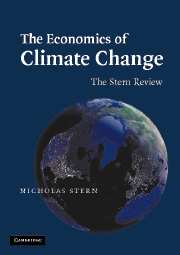Book contents
- Frontmatter
- Contents
- Preface
- Acknowledgements
- Introduction
- Summary of Conclusions
- Part I Climate Change – Our Approach
- Part II Impacts of Climate Change on Growth and Development
- Part III The Economics of Stabilisation
- 7 Projecting the Growth of Greenhouse-Gas Emissions
- 7A Climate Change and the Environmental Kuznets Curve
- 8 The Challenge of Stabilisation
- 9 Identifying the Costs of Mitigation
- 10 Macroeconomic Models of Costs
- 11 Structural Change and Competitiveness
- 11A Key Statistics for 123 UK Production Sectors
- 12 Opportunities and Wider Benefits from Climate Policies
- 13 Towards a Goal for Climate-Change Policy
- Part IV Policy Responses for Mitigation
- Part V Policy Responses for Adaptation
- Part VI International Collective Action
- Abbreviations and Acronyms
- Postscript
- Technical Annex to Postscript
- Index
13 - Towards a Goal for Climate-Change Policy
Published online by Cambridge University Press: 05 March 2014
- Frontmatter
- Contents
- Preface
- Acknowledgements
- Introduction
- Summary of Conclusions
- Part I Climate Change – Our Approach
- Part II Impacts of Climate Change on Growth and Development
- Part III The Economics of Stabilisation
- 7 Projecting the Growth of Greenhouse-Gas Emissions
- 7A Climate Change and the Environmental Kuznets Curve
- 8 The Challenge of Stabilisation
- 9 Identifying the Costs of Mitigation
- 10 Macroeconomic Models of Costs
- 11 Structural Change and Competitiveness
- 11A Key Statistics for 123 UK Production Sectors
- 12 Opportunities and Wider Benefits from Climate Policies
- 13 Towards a Goal for Climate-Change Policy
- Part IV Policy Responses for Mitigation
- Part V Policy Responses for Adaptation
- Part VI International Collective Action
- Abbreviations and Acronyms
- Postscript
- Technical Annex to Postscript
- Index
Summary
KEY MESSAGES
Reducing the expected adverse impacts of climate change is both highly desirable and feasible. The need for strong action can be demonstrated in three ways: by comparing disaggregated estimates of the damages from climate change with the costs of specific mitigation strategies, by using models that take some account of interactions in the climate system and the global economy, and by comparing the marginal costs of abatement with the social cost of carbon.
The science and economics both suggest that a shared international understanding of the desired goals of climate-change policy would be a valuable foundation for action. Among these goals, aiming for a particular target range for the ultimate concentration of greenhouse gases (GHGs) in the atmosphere would provide an understandable and useful guide to policy-makers. It would also help policy-makers and interested parties at all levels to monitor the effectiveness of action and, crucially, anchor a global price for carbon. Any long-term goal would need to be kept under review and adjusted as scientific and economic understanding developed.
However, the first key decision, to be taken as soon as possible, is that strong action is indeed necessary and urgent. This does not require immediate agreement on a precise stabilisation goal. But it does require agreement on the importance of starting to take steps in the right direction while the shared understanding is being developed.
Measuring and comparing the expected benefits and costs over time of different potential policy goals can provide guidance to help decide how much to do and how quickly. Given the nature of current uncertainties explored in this Review, and the ethical issues involved, analysis can only suggest a range for action.
Information
- Type
- Chapter
- Information
- The Economics of Climate ChangeThe Stern Review, pp. 318 - 348Publisher: Cambridge University PressPrint publication year: 2007
